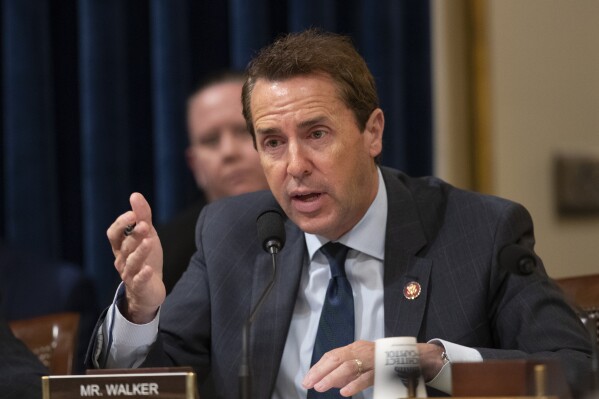In continuing battle between the branches, North Carolina judges block changes to some commissions
RALEIGH, N.C. (AP) — A panel of judges on Wednesday blocked changes for now that were made by North Carolina’s Republican-controlled legislature to three state boards, attempts opponents criticized as a partisan bid to end Democratic Gov. Roy Cooper’s control of a majority of seats on each.
The decision by the three judges to grant a preliminary injunction freezing those changes involved the Board of Transportation, the Commission for Public Health and a panel that awards incentives to companies that agree to create jobs in the state.
But the state judges declined to intervene in changes lawmakers also made to two commissions that set environmental regulations. They declared it didn’t appear the governor would be successful at an upcoming trial in getting the court to agree those alterations violated the state constitution.
The ruling, including the judges’ refusal to halt changes to the Environmental Management Commission and the Coastal Resources Commission, can be appealed to the state Court of Appeals.
 After redistricting, North Carolina state senator shifts to run in competitive district in 2024
After redistricting, North Carolina state senator shifts to run in competitive district in 2024
 Former US Rep. Mark Walker drops North Carolina gubernatorial bid to run for Congress
Former US Rep. Mark Walker drops North Carolina gubernatorial bid to run for Congress
 North Carolina Republicans put exclamation mark on pivotal annual session with redistricting maps
North Carolina Republicans put exclamation mark on pivotal annual session with redistricting maps
The ruling continues years of legal fighting between the governor and GOP legislative leaders over the balance of power in the two branches of government. Cooper sued legislative leaders and the state last month on the same day that the General Assembly overrode his veto of a measure that altered the composition of a dozen state boards and commissions.
Cooper is suing over changes to six boards in which his picks or those of future governors have composed all or a majority of the panel’s seats before the new law. He’s also challenging another law that creates a council designed to recommend building code changes for homes. Five were addressed during the injunction hearing.
A Cooper attorney said the injunction was needed because legislators have already made appointments under the new formats to several panels that would soon be meeting.
Previous lawsuits that Cooper and predecessor GOP Gov. Pat McCrory filed resulted in state Supreme Court opinions that affirmed a governor’s constitutional authority in specific cases to hold enough control over boards so that he can ensure that state laws are faithfully executed.
Cooper has said Republican legislators are ignoring those requirements while attempting a power grab by taking away his appointments to more boards and giving them to the General Assembly, its leaders or other statewide elected officials.
The changes are “an attempt to diminish the role of the governor and an attempt to aggregate power to themselves in the executive branch,” Cooper lawyer Jim Phillips told the judges.
Lawyers for House Speaker Tim Moore and Senate leaders Phil Berger defended the changes. They have said the previous Supreme Court rulings didn’t address the unique composition of these panels generated by the new laws, the attorneys said. For example, provisions challenged by Cooper altering the makeup of the two environmental panels would give appointments to the insurance commissioner and agriculture commissioner, who are statewide elected officials considered part of the executive branch.
“The executive branch continues to have a majority of the appointees,” Matthew Tilley, an attorney for the legislators, told the judges. “No case from the Supreme Court or otherwise holds that such an arrangement is unconstitutional.”
Superior Court Judges John Dunlow, Paul Holcombe and Dawn Layton didn’t explain in court why they issued the injunctions on the other three commissions except that Cooper had shown a “likelihood of success on the merits of his case,” Dunlow said. Dunlow and Holcombe are registered Republicans, while Layton is a Democrat. The final ruling in the case likely will rest with the state Supreme Court, where Republicans also hold a majority.
Cooper spokesperson Jordan Monaghan said after the ruling that the judges got it wrong on the two environmental panels because the governor “must have a majority of members on these Commissions.”
Under the new law, the legislature would now control four of the seven seats on the Economic Investment Committee and 14 of 20 seats on the Board of Transportation. And appointees from the General Assembly and the North Carolina Medical Society would pick the majority of the public health commission seats.
Last month, Cooper also filed a court challenge to another new law that would take away his power to appoint members of the State Board of Elections and give it to legislative leaders -- both Republicans and Democrats -- starting Jan. 1. The legislature also overrode Cooper’s veto of that bill, which would likely created a 4-4 party split among seats on the board.
Litigation between Cooper and Moore and Berger began days before he became governor in early 2017. Cooper, who is barred by term limits from running again in 2024, later sued to limit legislative power on multiple fronts, with mixed success in the courts.
Disclaimer: The copyright of this article belongs to the original author. Reposting this article is solely for the purpose of information dissemination and does not constitute any investment advice. If there is any infringement, please contact us immediately. We will make corrections or deletions as necessary. Thank you.






